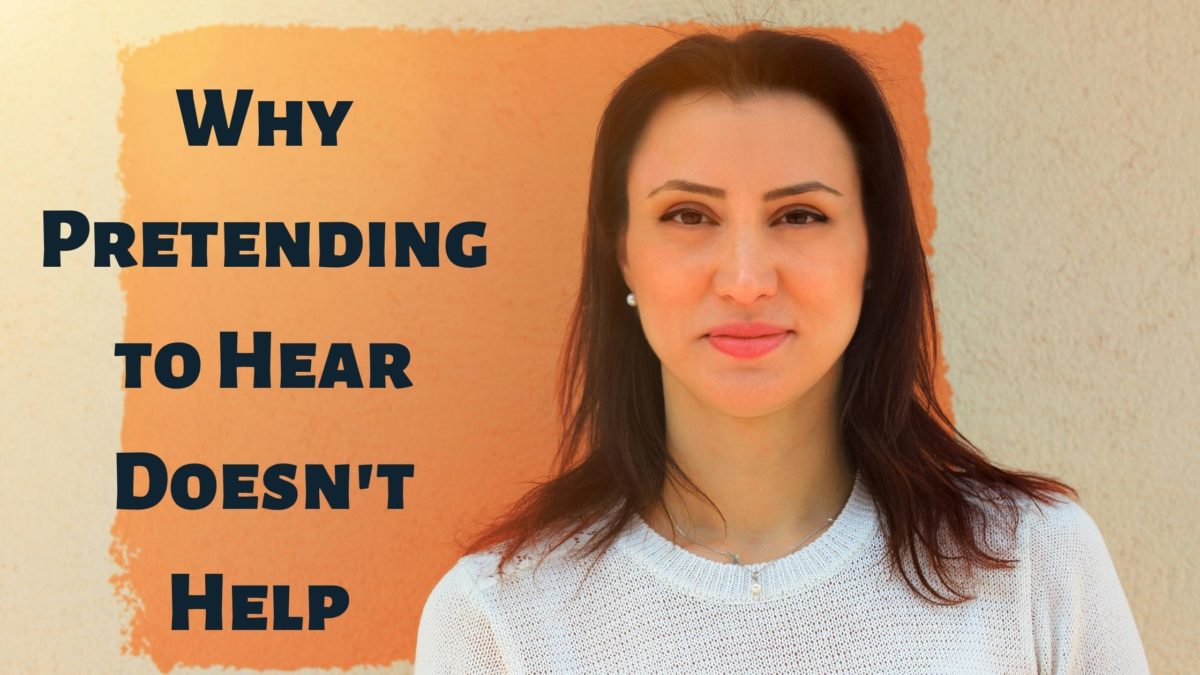
Why Pretending to Hear Doesn’t Help
The temptation sits there asking us to just pretend. Just this one time. Surely you’ll get away with it and no one will be the wiser. Pretending to hear what this person is saying to you — even though you can’t — is a tiny white lie that makes everyone more comfortable.
We’ve all done it in one circumstance or another. And it’s true, you can often smile and nod along, missing a piece of the conversation without any consequence. But sometimes, pretending to lie about hearing in a conversation can make for an even stickier situation. One where you’re called out on the lie — total humiliation — or two, you miss out on information of great importance. The truth is that pretending to hear just doesn’t really help.
Why we pretend to hear
People with perfect hearing pretend to hear all the time, perhaps not as often as people with hearing loss. But, it is human nature to find the easiest route through difficulty. In a noisy bar or cacophonous party, pretending to hear something your conversation companion said in a casual conversation is definitely much easier than stopping the conversation.
The alternative might disrupt the flow of conversation and we’re socially conditioned to help people around us find ease. We think it makes us easier to be around and ultimately more likable. Being accepted into the group is part of our very animalistic brain and it’s an instinct rather than a choice, because as pack animals, we are more likely to be ‘safe’ when we’re included in the group.
Ways pretending to hear can backfire
But let’s say the little white lie doesn’t work out. Then, we’re put in a much worse scenario that damages self-esteem, too. If we’re called on the carpet for pretending to hear, those moments of backpedaling and sheepish embarrassment can feel excruciating.
There’s also the chance, let’s say in a professional situation, in which pretending to hear can have unintended consequences that hurt our careers or are fireable causes. If your boss throws an aside at you after a meeting and you pretend to hear with a smile and thumbs-up, maybe they just complimented your work. But, what if they were actually giving you an important detail on your current project. And you don’t incorporate it into your slide deck. And then your presentation falls flat in front of your boss’s boss. That outcome is downright disastrous!
Instead of pretending to hear, do this
You have a choice the next time you notice the temptation to pretend to hear. You could practice some sentences in advance so that you’re prepared to pursue a different outcome. An easy sentence to use in many situations might be, “It’s really noisy in here and I’m having trouble hearing you. Could you repeat that?”
If you do have hearing loss, you could start to think about disclosing your condition to your conversation partners. Only do so if you feel safe in the relationship or in sharing that information. Practicing disclosure can also help you to normalize not hearing perfectly, which is part of accepting hearing loss in your life. It can also enlist the help of other people to include you better in conversations or make accommodations for your comfort.
For example, you might say “I have some hearing loss, so I’m having trouble hearing you correctly. Can we move to that quieter spot to continue our conversation?”
The dangers of untreated hearing loss
If pretending to hear is a habit for you, rather than a once in a while social white lie, there may be an underlying condition you are ignoring. Hearing loss is one of the leading chronic health conditions among Americans, with one in eight people over the age of 12 displaying hearing loss in both ears. We’re more likely to encounter hearing loss as we age. One in three people over the age of 65 has hearing loss in the United States.
And while hearing loss is a common issue, it’s also a historically untreated condition. People tend to monitor their eyesight with much greater regularity than their hearing. And as far as treatment goes, the trends are even more pronounced. While people regularly choose to treat deterioration of eyesight with contacts, glasses or even surgery, hearing health isn’t given quite that much investment. Only one-third of people with hearing loss wear hearing aids, despite the fact that almost 90% of people who do wear hearing aids report high satisfaction with their choice of intervention.
If you think that hearing loss is contributing to an increase in pretending to hear, make an appointment to schedule a hearing consultation.
